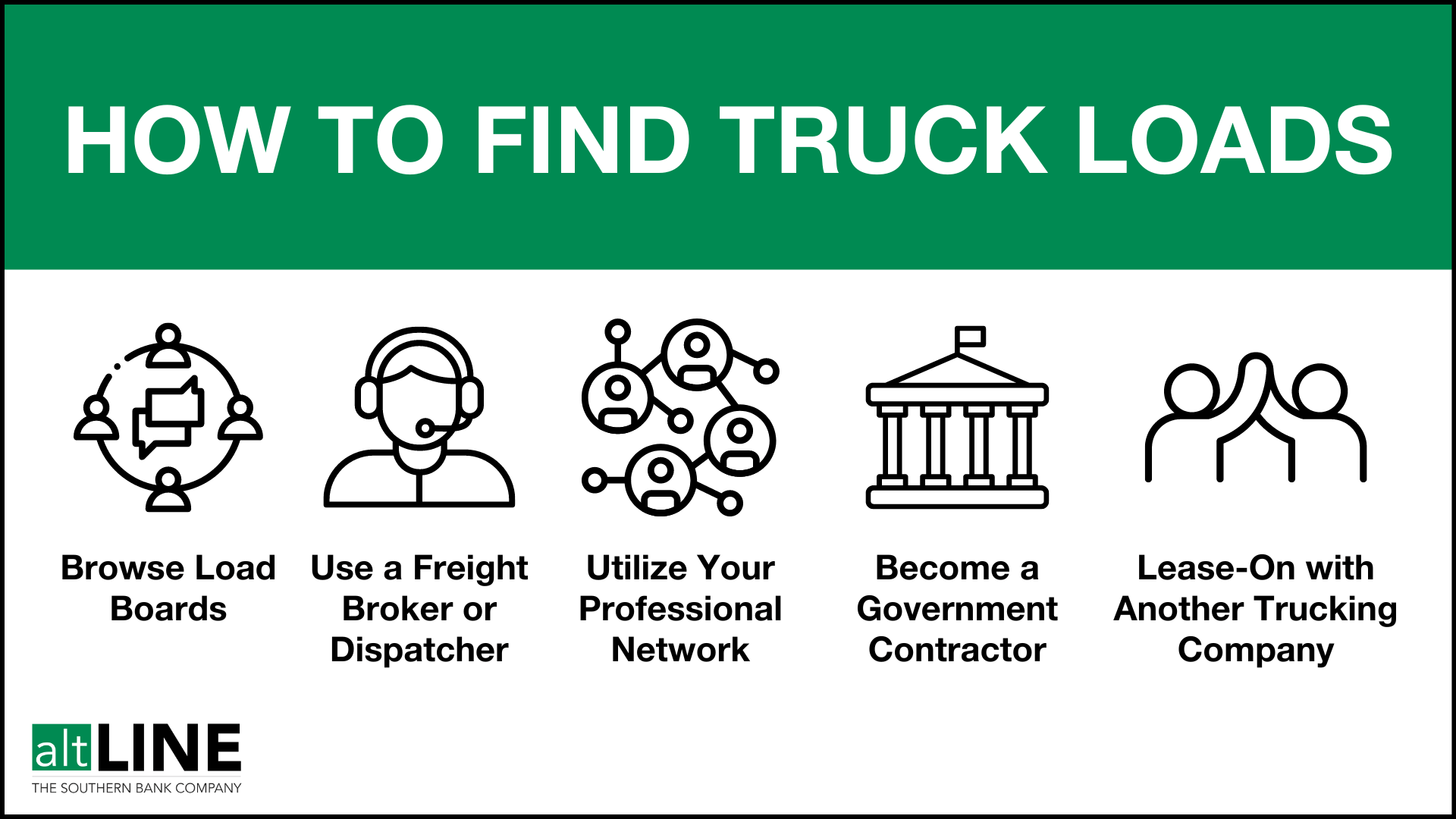Last Updated September 30, 2025
Turn your unpaid invoices into working capital for your business
Finding loads to haul is one of the most universal challenges for those in the trucking industry. The most recent trucking industry data revealed that the U.S. trucking market returned revenues close to $1 trillion in 2024, so you know the loads are out there, but how do you find them?
For large-fleet drivers and owner-operators to be successful, it’s pivotal to know how to find loads efficiently. If you’re not maximizing your schedule, you’re not maximizing profits.
If you’re a carrier finding yourself asking the question, “How do I find loads to haul?” continue reading, as we’ve come up with six ways to secure loads for your trucks, with a few resources to help you out in the process. By doing so, you can ensure you’re exploring every avenue to help your business become as profitable as possible.
Key Takeaways
- Carriers can find loads in a variety of ways, including online load boards, mobile apps, freight brokers, dispatch services, and government contracts.
- Building strong professional networks is often the most effective long-term way to consistently book hauls.
- Flexibility, persistence, and smart research are essential to maximize profits and keep trucks moving.
- The trucking industry is huge (revenues around $1 trillion, with more than 8 million employees) but finding steady loads remains a top challenge for carriers, particularly single-truck owner-operators.
How to Find Truck Loads
If you run your own trucking business or you’re in the beginning stages of becoming an owner-operator, you should make note of the following seven ways to assist in finding and scheduling future hauls.

1. Browse Online Load Boards
Online load boards make finding loads for trucks accessible for every trucking company, regardless of the type of freight you haul. You can think of a load board as an online marketplace that connects freight brokers and shippers with carriers, or vice versa. They are extremely popular and a great way to find your next haul to transport because they are easy to use and convenient to access.
If you do find freight to haul via a load board, you should also find all of the information you need to complete the haul in the same place, including:
- What materials or goods require shipping
- The address of the current location and final destination
- The material’s weight
- A section for you to provide your business’s rates and fees
- Any additional information required to complete the haul
While browsing a load board, even if you don’t see any potential loads to haul that work for your business, it can still be a highly beneficial tool for uncovering what’s going on in your industry and potential future leads or opportunities.
Related: Best Load Boards for Truckers
2. Download Load Board Mobile Apps
Downloading and browsing load board mobile applications is also a quick and efficient method for finding freight to haul and networking with truckers.
Here are a few mobile apps that every trucker should have downloaded from the App Store. Some of these include:
Trucker Path. By downloading TruckerPath’s Truck Load app, you’ll have access to more than 100,000 loads every day. Once you’ve downloaded the app, simply enter your pickup information, deadhead, and equipment type to find your next freight to haul.
123LoadBoard. With 4.9 stars, 123LoadBoard is an extremely highly rated app for finding loads for your truck.
NextTruck. This is an online freight marketplace where you can communicate with fellow truckers in order to find and book loads. NextTruck, along with the above applications, can also be helpful in connecting and forming strong professional relationships with other truckers and owner-operators (remember, networking is important!).
3. Use a Freight Broker
Working with a freight broker is one of the most common ways that trucking business owners secure loads to haul.
Freight brokers ease the process by taking much of the back and forth off the shoulders of owner-operators, including negotiating load rates and finalizing pick-up and drop-off times and locations.
However, freight brokers will take a significant portion of the profit made from a respective load, reducing your overall take home pay. For reference, these brokering fees can be up to 20–25% of the cost of the load. Because of these high fees, small trucking businesses or new owner-operators with little startup capital must do proper due diligence prior to negotiating pay with a freight broker.
Though for trucking companies with a healthy net profit margin and positive cash flow, freight brokers are worthwhile given they handle various time-consuming responsibilities in return.
4. Build Your Network
According to CNBC, up to 80% of jobs are filled through personal and professional networking. In fact, 70% of jobs aren’t even posted publicly.
In the trucking world, it’s no different. Networking is perhaps the best way to get loads for trucks. In addition to scouring load boards for freight to haul, building lasting relationships with the freight brokers you work with can lead to more work down the line. The more freight brokers who know you’re looking for shipments to haul equals means more opportunities in the future.
Building a network takes time, but it’s not a complicated process. By simply reaching out to potential business partners and being straightforward, polite, and honest, you can find business opportunities that can prove mutually beneficial. Even if each networking effort doesn’t lead to securing a new job, it can still introduce you to new freight brokers and strengthen your reputation, both of which can open doors for future opportunities.
If you’re an owner-operator, consider attending truck shows, conferences, trucking associations, or other networking events. Even if you don’t own your own trucking company, put forth the effort by getting out and shaking hands; you never know which person might lead to a great opportunity without introducing yourself.
If you’re in a time crunch and can’t travel to in-person networking events, utilize social media to stay in the know, and don’t be afraid to reach out to people online. Even just placing a phone call can open new doors.
5. Become a Government Contractor
Obtaining a government contract as an owner-operator provides several benefits, one of which is guaranteed payments. The General Services Administration (GSA) and Department of Defense (DOD) are two main sources for finding government contracts as a trucker.
While the payment process might be a bit more drawn out when working with the government, you can rest assured that you will receive payment. To speed up the process, you’ll have to ensure that your invoices are accurate. Additionally, if you find that it’s taking too long to get paid as a government contractor, you can check out services like freight factoring to quicken your access to capital.
Getting loads for trucks by becoming a government contractor can be competitive. Make sure you know how to write up a bid, you’ve done thorough research on specific requirements, and you’ve performed all of the necessary calculations you’ll need in order to secure a bid.
6. Utilize Dispatch Services
As a carrier, paying for dispatch services in addition to brokers can be an effective way to conduct business with shippers.
If you have your own motor carrier authority, a personal dispatcher or a dispatching company can assist in a few ways aside from just searching for loads for your truck. They can aid in completing general paperwork, including performing accounting tasks, and help with managing the overall flow of your loads. This assistance on the project management side is much appreciated by many owner-operators, as it allows them to prioritize the actual money-making task: hauling freight.
The one downside to utilizing dispatch services is the cost. If you choose this route, you should expect your dispatch service to charge a 5–10% fee for each load, if not a flat rate. For new owner-operators or owners of small trucking businesses operating on thin margins and tight budgets, this might not be the very best choice. Still, it’s an option that should be considered.
7. Lease-On with a Company
With a lease-on agreement, an owner-operator leases their rig and other equipment to a separate, typically larger trucking company. The owner-operator’s truck is then available for use under the new company’s name, with newfound access to existing and future truck loads. By leasing-on, the owner-operator can benefit in a few ways.
First, leasing-on can grant you access to additional, private load boards. These load boards allow you to find freight to haul that not all owner-operators have access to; thus, there’s not as much competition.
Plus, you can take advantage of the company’s purchasing power for potential discounts on fuel and truck maintenance, which can prove really useful for owner-operators looking for ways to save cash and improve their profit margin.
Overall, leasing-on can prove very effective for owner-operators with the general benefit being that you are granted added stability and financial support, while still maintaining a good level of freedom in terms of the loads you’re hauling.
Related: Leasing-On vs. Operating Under Your Own Authority
Interested in Factoring?
Turn your unpaid invoices into working capital so you can keep growing your trucking business.
Considerations When Finding Loads to Haul
Consider the following when you’re spending time trying to find and book loads for your trucking business:
Don’t Sell Yourself Short
You’ve come this far as a trucking business owner. Regardless of your circumstances, be proud of your achievements and don’t be afraid to brag on yourself a bit when connecting with industry leaders or freight brokers to secure loads for your trucking company. Remain professional, obviously, but be confident that your trucking business is one worth partnering with.
Be Flexible
Those at the top of their professions are there because they’re comfortable with being uncomfortable. They’ve intentionally put themselves in situations where they’re not comfortable in order to grow their skill sets by learning new ways to do things and seeing challenges from different perspectives.
As an owner-operator or someone in charge of booking loads for trucks, you should have this same mindset. Sure, sticking to a niche can be a wise business tactic by carving out your own area that you dominate. But if you find yourself struggling to find shipments to haul, it’s time to be flexible and perhaps reconsider trucking business plan. Some ways to do so include:
- Being open to new routes
- Adapting to market trends
- Diversifying your service
- Learning about, or using, unfamiliar technologies
In general, you, as a trucking business owner, should keep an open mind. This extends to items such as trucking payment methods and financing methods, such as quick pay vs. factoring.
Stay Motivated
As a business owner, particularly an owner-operator, times aren’t always going to be easy. Once one challenge has been overcome, there’s likely to be another obstacle at your doorstep. Don’t worry; every trucking business owner deals with circumstances out of their control that can lead to negative cash flow, loss of revenue, and other financial measures.
Stay even keeled and remain focused on the task at hand. For example, if you’ve spent hours on a load board and you’ve come away not finding a load for your truck, try one of the different methods listed above, like using your professional network or cold-calling brokers in your area.
Do Your Homework
Any important decision you make should be well thought-out and thoroughly analyzed, and scheduling future hauls for your box truck should be no different.
If you’ve reached this point of the article, you’re on the right track! You’re clearly doing your due diligence by researching effective ways to find loads for your truck. Now, it’s time to implement the skills you’ve learned. Use your newfound knowledge to find your next load and set your trucking business up for success.
In-Summary: How to Find Freight to Haul
Ultimately, the most effective way to get loads to haul may differ on a carrier-by-carrier basis. For instance, new owner-operators might find that load boards are the most cost-effective option, whereas utilizing brokers or dispatch services might be worth the cost for more established owner-operators.
Regardless, it’s important to keep the following two tips in mind:
- Networking and relationship-building is incredibly important in the trucking this industry, so be mindful of that when you’re talking to someone who can’t lead you to new business in the present, but who could potentially lead you to new business in the future.
- Don’t let any difficulties finding loads to book affect your motivation, especially if you’re in the early stages of your trucking business. You will eventually figure out what works and what doesn’t. Trust the process!
How to Find Truck Loads FAQs
How do carriers find hot shot loads?
The best way to find hot shot trucking loads is to utilize a load board that has a designated board specifically for hot shot truckers, such as DAT or TruckStop.
Where can I find loads for box trucks?
DAT has a load board tailored for box truck drivers and carriers with a wide range of listings posted daily.
What are the best load board apps for carriers?
123 Load Board, NextTruck, and Trucker Path all have widely used load board apps that serve as a mobile, online marketplace to find freight to haul.
How do you get freight loads without a broker?
There are plenty of ways carriers find loads without a broker. It’s common for carriers to simply utilize their network in the industry such as other carriers, to find loads. Dispatch services can also assist with connecting carriers with shippers for profitable shipments. Additionally, many trucking businesses get loads by becoming government contractors.
Michael McCareins is the Content Marketing Associate at altLINE, where he is dedicated to creating and managing optimal content for readers. Following a brief career in media relations, Michael has discovered a passion for content marketing through developing unique, informative content to help audiences better understand ideas and topics such as invoice factoring and A/R financing.










